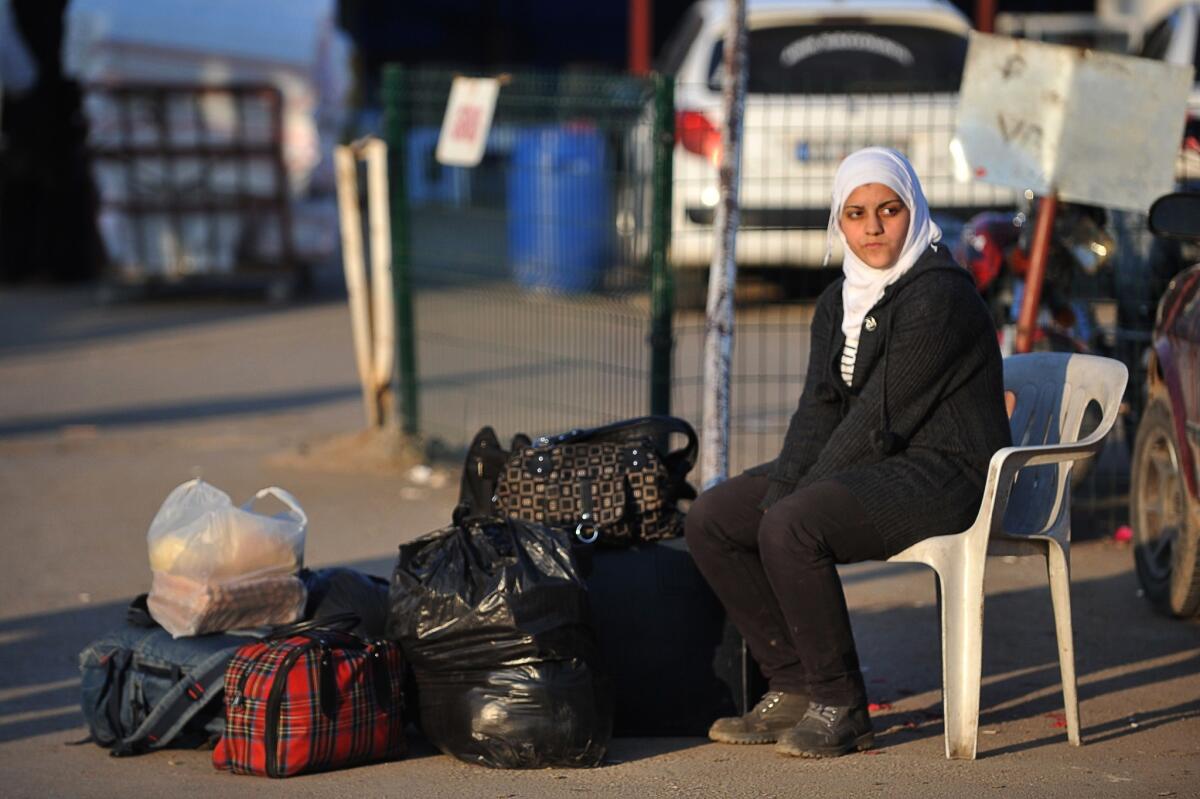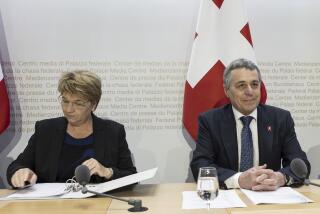Syria opposition group votes to attend peace conference

BEIRUT — Despite deep divisions, the major U.S.-backed Syrian opposition bloc voted Saturday to participate in peace talks scheduled to begin next week in Switzerland, ending months of uncertainty about whether the group would attend the long-anticipated negotiations.
“We are going to the conference without heads held high for those who are witnessing the most heinous massacres in history,” a sullen Ahmad Jarba, the coalition president, told reporters gathered at a hotel outside Istanbul, Turkey, where the opposition delegates gathered.
The coalition vote would seem to ensure that the conference — the first face-to-face meeting between the exiled opposition and the government of President Bashar Assad — would begin as scheduled on Wednesday in the Swiss city of Montreux.
Though the conference is viewed as the most concerted international effort to end the almost-three year civil war, it is still an open question whether the talks will accomplish much to end the bloodshed in Syria.
Mixed signals from the opposition had left an air of uncertainty as the so-called Geneva II conference was set to kick off. Coalition activists, who had long vowed never to negotiate with the Assad government, had pushed without success for iron-clad guarantees that the talks would lead to Assad’s departure from office.
In Washington, U.S. Secretary of State John F. Kerry lauded the decision Saturday as a “courageous” move.
The decision averted a potential embarrassment for the Obama administration, which had engaged in months of diplomatic cajoling and arm-twisting in an effort to convince its hesitant allies and proxies to come to the peace table.
The United States and Russia are major sponsors of the talks, organized under the auspices of the United Nations. Russia is a key ally of Assad, while the United States has thrown its weight behind the Syrian opposition and backed its calls for Assad to step down.
More than 30 nations will attend the conference, but a major regional player, Iran, a close ally of Assad’s government, has so far been excluded at the insistence of Washington.
The Syrian government, working closely with Moscow, has said it would send a high-ranking diplomatic delegation to Switzerland.
Representatives of both the United States and Russia have agreed that a political solution is the only means to end the war, which has left more than 100,000 people dead, forced millions from their homes and sown instability throughout the Middle East.
The stated goal of the Geneva talks is to create a transitional governing authority by “mutual consent” of the negotiating parties, leading eventually to democratic elections. U.S. diplomats and their allies insist this means that Assad must cede power, but Syrian and Russian officials say Assad’s departure is not predetermined.
Despite widespread skepticism that the talks will accomplish much of substance, many Syrians and others see the start of some kind of peace initiative as a rare glimmer of hope. Any peace process is likely to drag on for months if not years amid a sectarian-fueled conflict that has left much of the nation in ruins and torn apart the delicate fabric of Syrian society.
Along with pressures from Western, Arab and other backers to attend Geneva II, the opposition coalition also faced criticism from rebel commanders who view the talks as a betrayal. The coalition is a largely exiled-based assemblage with limited influence on fighters in Syria.
Still unclear is the extent to which rebel factions nominally under the coalition’s umbrella will participate in Geneva. The coalition includes the so-called Free Syrian Army, a loose federation of fighting groups in a nation where hundreds of factions with varying agendas have taken up arms, including several Al Qaeda affiliates and other Islamic militants. Infighting among rebel factions has become a major problem and opened the way for recent government advances on the battlefield. Coalition officials said its military wing backed Saturday’s decision to participate in Geneva II.
The coalition, known formally as the National Coalition of Syrian Revolutionary and Opposition Forces, was formed in November 2012 in Qatar with an explicit vow that it would never negotiate with Assad. A previous coalition president, Moaz Khatib, was subject to intense internal criticism after he said publicly he would be willing to talk to the Syrian government if the move helped to save lives. He later left the coalition.
On Saturday, the coalition said 58 delegates voted in favor of attending the conference, 14 voted against, two abstained and one submitted a blank ballot. But 44 other delegates boycotted in apparent protest, meaning a majority of members did not vote in favor of attending Geneva II.
On Sunday, the opposition coalition reportedly plans to name a 15-person delegation to attend the talks. They will face a formidable government team, led by a veteran diplomat, Syrian Foreign Minister Walid Moallem, Damascus’ former ambassador in Washington.
Twitter: @mcdneville
More to Read
Sign up for Essential California
The most important California stories and recommendations in your inbox every morning.
You may occasionally receive promotional content from the Los Angeles Times.










